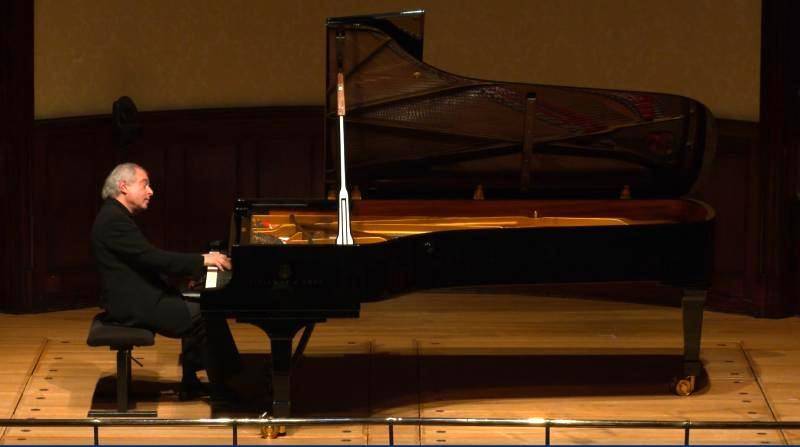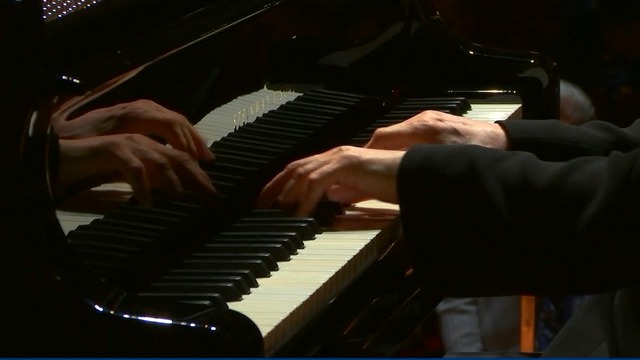András Schiff, Wigmore Hall review - mystery marvels mesmerise | reviews, news & interviews
András Schiff, Wigmore Hall review - mystery marvels mesmerise
András Schiff, Wigmore Hall review - mystery marvels mesmerise
A surprise programme of less obvious works casts a spell all its own

As András Schiff remarked from the stage early in this fairly remarkable evening, his usual audience knows he’s not about to play Rachmaninov. The idea for this concert last night and his return visit today, is that we turn up not knowing exactly what we will hear, beyond the name of a composer or two. He has a point. Why should pianists have to decide on every detail of their programmes two years in advance, sometimes more?
This programme – the first in a long weekend of celebrations for Wigmore Hall's 120th birthday – might have looked strange on paper, had it been set out ahead, but it worked a treat. It contained three of Beethoven’s less instantly saleable sonatas – all of them mesmerising pieces of the finest quality, but which we don’t hear nearly as often as we should. Schiff introduced the concert himself and grouped the interval-free 90 mins (another innovation he hopes to keep post-Covid) into three sections: each consisted of a sonata in an unusual key, preceded by Bach’s preludes and fugues in the same key from books 1 and 2 of the ‘48’ The Beethovens were the A flat major Op. 26, the D minor Op. 31 No. 2, the "Tempest" and the F sharp major Op. 78 – one of Beethoven’s own favourites, sometimes known as ‘À Therese’ thanks to its dedication to Countess Therese von Brunsvik, a Hungarian educational pioneer and one-time pupil of the composer.
There’s something marvellously anti-gravitational about Schiff’s playing. His Bach finds him bouncing through dance rhythms, batting the notes as lightly as a cat toying with a creature it doesn’t yet want to kill. Textures are airy, indeed delectabubble, and legatos true-centred, created without a vestige of pedal-cheating. The temperature is cool, the voicing judiciously balanced: these fugues are not heavy weather, or drily academic, but just a step away from Bach solving a crossword puzzle.  These three Beethoven sonatas all begin and end quietly – probably another reason they’re not programmed so much – and the first sounds of the "Tempest" set up a dark enchantment, those of the F sharp sonata a prayer-like invocation. Whether Beethoven really was thinking of Shakespeare in the D minor sonata, we’ll never know; it seems to me that the slow movement might perhaps be a response to"‘Full fathom five thy father lies" (can you hear the bells tolling under the water?). But while others might scamper through its revolving globe of a finale, Schiff created a remarkable sense of mystery by restraining the tempo and infusing the purling semiquavers with a kind of other-worldly wisdom that did in its own way seem wholly Shakespearean.
These three Beethoven sonatas all begin and end quietly – probably another reason they’re not programmed so much – and the first sounds of the "Tempest" set up a dark enchantment, those of the F sharp sonata a prayer-like invocation. Whether Beethoven really was thinking of Shakespeare in the D minor sonata, we’ll never know; it seems to me that the slow movement might perhaps be a response to"‘Full fathom five thy father lies" (can you hear the bells tolling under the water?). But while others might scamper through its revolving globe of a finale, Schiff created a remarkable sense of mystery by restraining the tempo and infusing the purling semiquavers with a kind of other-worldly wisdom that did in its own way seem wholly Shakespearean.
That was the central D minor section of the programme. First came A flat, the Op. 26 Sonata, full of originality and immensely influential: lightly-worn variations to begin, a not-so-funny scherzo and a funeral march, a step on the way to the ‘Eroica’ and one that Schubert must later have known (he seems to have pinched an idea for his late G major String Quartet) before a gentle rondo that foreshadows the subtle, wistful conclusions that Brahms loved. The two-movement F sharp major Sonata is tender, vivid and witty within its rather weird key and provided a joyous conclusion.
For encore, I wondered if Schiff might go into B flat major and choose Op. 106, but no: a sprightly little Bach two-part invention did the job instead. This was the one that floats in at the end of the Beatles’ ‘All You Need Is Love’, which may be pure coincidence, but might say plenty about what was for many of us the first night back in Wigmore Hall after a very long winter.
rating
Explore topics
Share this article
The future of Arts Journalism
You can stop theartsdesk.com closing!
We urgently need financing to survive. Our fundraising drive has thus far raised £49,000 but we need to reach £100,000 or we will be forced to close. Please contribute here: https://gofund.me/c3f6033d
And if you can forward this information to anyone who might assist, we’d be grateful.

Subscribe to theartsdesk.com
Thank you for continuing to read our work on theartsdesk.com. For unlimited access to every article in its entirety, including our archive of more than 15,000 pieces, we're asking for £5 per month or £40 per year. We feel it's a very good deal, and hope you do too.
To take a subscription now simply click here.
And if you're looking for that extra gift for a friend or family member, why not treat them to a theartsdesk.com gift subscription?
more Classical music
 First Person: Manchester Camerata's Head of Artistic Planning Clara Marshall Cawley on questioning the status quo
Five days of free events with all sorts of audiences around Manchester starts tomorrow
First Person: Manchester Camerata's Head of Artistic Planning Clara Marshall Cawley on questioning the status quo
Five days of free events with all sorts of audiences around Manchester starts tomorrow
 Goldscheider, Brother Tree Sound, Kings Place review - music of hope from a young composer
Unusual combination of horn, strings and electronics makes for some intriguing listening
Goldscheider, Brother Tree Sound, Kings Place review - music of hope from a young composer
Unusual combination of horn, strings and electronics makes for some intriguing listening
 theartsdesk Q&A: composer Donghoon Shin on his new concerto for pianist Seong-Jin Cho
Classical music makes its debut at London's K-Music Festival
theartsdesk Q&A: composer Donghoon Shin on his new concerto for pianist Seong-Jin Cho
Classical music makes its debut at London's K-Music Festival
 Helleur-Simcock, Hallé, Wong, Bridgewater Hall, Manchester review - moving lyricism in Elgar’s concerto
Season opener brings lyrical beauty, crisp confidence and a proper Romantic wallow
Helleur-Simcock, Hallé, Wong, Bridgewater Hall, Manchester review - moving lyricism in Elgar’s concerto
Season opener brings lyrical beauty, crisp confidence and a proper Romantic wallow
 Kohout, Spence, Braun, Manchester Camerata, Huth, RNCM, Manchester review - joy, insight, imagination and unanimity
Celebration of the past with stars of the future at the Royal Northern College
Kohout, Spence, Braun, Manchester Camerata, Huth, RNCM, Manchester review - joy, insight, imagination and unanimity
Celebration of the past with stars of the future at the Royal Northern College
 Jansen, LSO, Pappano, Barbican review - profound and bracing emotional workouts
Great soloist, conductor and orchestra take Britten and Shostakovich to the edge
Jansen, LSO, Pappano, Barbican review - profound and bracing emotional workouts
Great soloist, conductor and orchestra take Britten and Shostakovich to the edge
 Jakub Hrůša and Friends in Concert, Royal Opera review - fleshcreep in two uneven halves
Bartók kept short, and a sprawling Dvořák choral ballad done as well as it could be
Jakub Hrůša and Friends in Concert, Royal Opera review - fleshcreep in two uneven halves
Bartók kept short, and a sprawling Dvořák choral ballad done as well as it could be
 Hadelich, BBC Philharmonic, Storgårds, Bridgewater Hall, Manchester review - youth, fate and pain
Prokofiev in the hands of a fine violinist has surely never sounded better
Hadelich, BBC Philharmonic, Storgårds, Bridgewater Hall, Manchester review - youth, fate and pain
Prokofiev in the hands of a fine violinist has surely never sounded better
 Monteverdi Choir, ORR, Heras-Casado, St Martin-in-the-Fields review - flames of joy and sorrow
First-rate soloists, choir and orchestra unite in a blazing Mozart Requiem
Monteverdi Choir, ORR, Heras-Casado, St Martin-in-the-Fields review - flames of joy and sorrow
First-rate soloists, choir and orchestra unite in a blazing Mozart Requiem
 Cho, LSO, Pappano, Barbican review - finely-focused stormy weather
Chameleonic Seong-Jin Cho is a match for the fine-tuning of the LSO’s Chief Conductor
Cho, LSO, Pappano, Barbican review - finely-focused stormy weather
Chameleonic Seong-Jin Cho is a match for the fine-tuning of the LSO’s Chief Conductor
 Classical CDs: Shrouds, silhouettes and superstition
Cello concertos, choral collections and a stunning tribute to a contemporary giant
Classical CDs: Shrouds, silhouettes and superstition
Cello concertos, choral collections and a stunning tribute to a contemporary giant
 Appl, Levickis, Wigmore Hall review - fun to the fore in cabaret and show songs
A relaxed evening of light-hearted fare, with the accordion offering unusual colours
Appl, Levickis, Wigmore Hall review - fun to the fore in cabaret and show songs
A relaxed evening of light-hearted fare, with the accordion offering unusual colours

Add comment